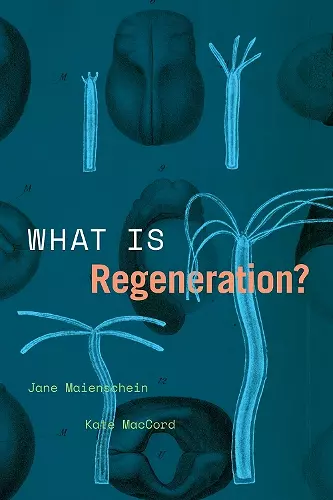What Is Regeneration?
Jane Maienschein author Kate MacCord author
Format:Paperback
Publisher:The University of Chicago Press
Published:6th Apr '22
Should be back in stock very soon

Two historians and philosophers of science offer an essential primer on the meaning and limits of regeneration.
In punishment for his stealing fire, the Greek gods chained Prometheus to a rock, where every day an eagle plucked out his liver, and every night the liver regenerated. While Prometheus may be a figure of myth, scholars today ask whether ancient Greeks knew that the human liver does, in fact, have a special capacity to regenerate. Some organs and tissues can regenerate, while others cannot, and some organisms can regenerate more fully and more easily than others. Cut an earthworm in half, and two wiggly worms may confront you. Cut off the head of a hydra, and it may grow a new head. Cut off a human arm, and the human will be missing an arm. Why the differences? What are the limits of regeneration, and how, when, and why does it occur?
In this book, historians and philosophers of science Jane Maienschein and Kate MacCord explore biological regeneration, delving into a topic of increasing interest in light of regenerative medicine, new tools in developmental and neurobiology, and the urgent need to understand and repair damage to ecosystems brought on by climate change. Looking across scales, from germ, nerve, and stem cells to individual organisms and complex systems, this short and accessible introduction poses a range of deep and provocative questions: What conditions allow some damaged microbiomes to regenerate where others do not? Why are forests following a fire said to regenerate sometimes but not always? And in the face of climate change in the era called the Anthropocene, can the planet regenerate to become healthy again, or will the global ecosystem collapse?
"From hydras to humans, this short book by two marine biologists explores the peculiar process of regeneration. . . . So here is the problem: if the mechanisms of regeneration can’t be distinguished from those of growth and development, what is to stop everything ceaselessly regenerating? What dictates the process of regrowth and why does it happen only in some tissues, in some species and only some of the time? Maienschein and MacCord argue that, to fully understand this, we need to see regeneration as a window into the world of biology in general, and the complex feedback loops that decide what grows, divides and dies, where and when. Far from being an interesting curio, then, studying regeneration can tell us much about life in general, from a cellular level right up to the level of ecosystems, and inform everything from regenerative therapies using stem cells to ecosystem protection and recovery. Seen through this lens, regeneration is a far bigger subject than it might at first seem." -- Simon Ings * New Scientist *
"The most thought-provoking and enjoyable book I've read in years. I thoroughly recommend it to all who want to exercise their grey matter, to think differently and without horizons." * Marine Biologist *
"In their new book What Is Regeneration?, Prof. Jane Maienschein and Dr.Kate MacCord present an introduction to what is presently known about biological regeneration. Approaching their subject from both the history and philosophy of science, as well as from practical biology, and ranging from micro through macro levels in their explanations, the authors present the 'nuts and bolts' of regeneration." * The Well-Read Naturalist *
"Maienschein and MacCord adopt a systems-based approach to explore the logic of regeneration and consider the shift in the meaning of the term regeneration over time. . . . This book lays the groundwork for a projected series, with the intention of helping a wide audience—ranging from scholars to policy makers and including general readers—gain a new understanding of regeneration as a process characteristic of all living systems." * Choice *
"This book brings optimism to a world in need of it, pointing out that science, while unable on its own to halt destruction, offers ever more keys to restoring our living systems that can still be saved." * Metascience *
“The book shows exceptional strengths and represents a unique approach that is not only beneficial for a wide audience, but also is needed to face current challenges to humanity and global ecological developments. An essential contribution.” -- Hanna Lucia Worliczek, University of Vienna, Austria
“A truly thought-provoking book, meant not only for students and scientists, but also politicians and laypersons.” -- Eric Röttinger, Institute for Research on Cancer and Aging, Université Côte d’Azur, France
ISBN: 9780226816562
Dimensions: 216mm x 140mm x 28mm
Weight: 227g
184 pages